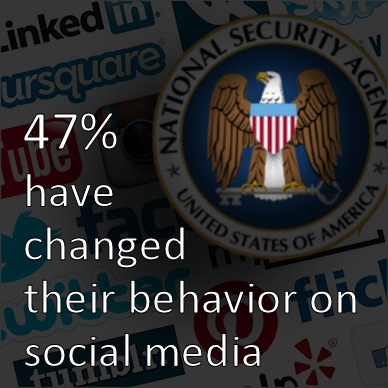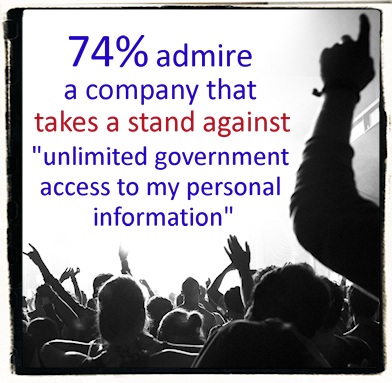Our recent survey about consumer opinion in the wake of the Snowden revelations about mass NSA electronic surveillance suggests that the economic implications could be deeper than experts have yet acknowledged, including negative impact on corporate profits and GDP. At the same time, like every economic challenge, the NSA revelations present some interesting opportunities for the enterprising.
[Update November 15: A podcast on this topic is now online. Also, the first We Live Security article discussing these survey results is online here]
The digital economy takes a hit
How could the Snowden/NSA news damage GDP and profits? How about a reduction in online shopping and online banking. Our survey data suggests this reduction is not hypothetical, it is real, and not just a few percentage points. Close to one in five Americans we surveyed said they were doing less banking online as a result of the Snowden/NSA revelations. That's a 20% hit to a trend that the retail banking sector has been counting on to achieve profitability targets: people shifting away from banking at costly branches and through postal mail. That trend could be stalling and those targets could now be in jeopardy.
 And retail banking is just one of many sectors of the economy that has been relying on ever-increasing levels of online activity to maintain profitability.
And retail banking is just one of many sectors of the economy that has been relying on ever-increasing levels of online activity to maintain profitability.
Consumer spending drives the American economy and shifting that spending from brick-and-mortar stores to the digital realm has been a key strategy for retail firms.
Our survey indicates that, post-Snowden/NSA, retailers are looking at 14% of Americans doing less shopping online. That doesn't necessarily mean less total shopping, but it does undermine the strategies and logistics behind the biggest retail spending period of the year, which is now well under way. I doubt that retailers have planned to staff and stock physical stores to cope with an unforeseen surge in foot traffic diverted from websites due to a drop in online trust sparked by news of government surveillance.
Beyond the obviously Internet-dependent sectors of banking and retailing, the drop in online technology confidence that we charted in our survey impacts all Internet-using entities in general, and technology firms specifically. For example, one in five Americans surveyed said that they were now less inclined to use email. Consider what that means for state and local governments, for email advertisers, for phone companies and other firms that rely on email for billing and support. And how about healthcare, where parties of all stripes have pinned their hopes for cost containment on greater leverage of the Internet?
Giant feet of clay
 So you might be wondering what this means for two of the biggest plays in tech stocks, social media giants Facebook and Twitter. Yes, I know that Twitter has not IPO'd yet, but the IPO is coming and the "NSA factor" could influence pricing. How? Some 47% of people we surveyed said that they had changed how they used social media because of the Snowden/NSA revelations. Changed how? They agreed with the statement: "I am more careful about what I share via social media." This does not mean a bunch of people are dropping social media, but I find it pretty shocking that almost half who do use it are now thinking differently about what they share.
So you might be wondering what this means for two of the biggest plays in tech stocks, social media giants Facebook and Twitter. Yes, I know that Twitter has not IPO'd yet, but the IPO is coming and the "NSA factor" could influence pricing. How? Some 47% of people we surveyed said that they had changed how they used social media because of the Snowden/NSA revelations. Changed how? They agreed with the statement: "I am more careful about what I share via social media." This does not mean a bunch of people are dropping social media, but I find it pretty shocking that almost half who do use it are now thinking differently about what they share.
Of course, one could quip that security professionals like myself have spent years trying to get people to be more careful about what they share on social media so we owe NSA a big "thank you" for achieving this sudden boost in awareness. But if the business plan of your social media company, or the one in which you're thinking of investing, is predicated on people sharing more, not less, then I would be troubled, particularly since things are not likely to get any less scary for consumers, and assurances of privacy and confidentiality are easy to make while new revelations keep on appearing.
And this is where the NSA may have unwittingly poisoned the well for a broad swathe of technology companies, while undermining some of the pillars of cyberspace, like Google and Yahoo. Even before it was revealed that the NSA had tapped the fiber optic cables connecting the data centers used by these two Internet giants, a solid 50% of our survey respondents agreed with this statement: "I am now less trusting of technology companies, such as Internet service providers and software companies."
Ouch! You don't need a team of economists to tell you it's not good for businesses or consumers or the country as a whole when technology companies, such as Internet service providers and software companies, lose that amount of trust. And you don't need to be an expert in irony to see that knowledge of the actions of the NSA appears to be undermining the fabric of our cyber-based economy and society.
Actually, that team of economists might be handy for figuring out all the ways in which our responses to mass electronic surveillance impact our use of electronics, and what that will mean for businesses and consumers over the next few years. Hopefully politicians will consider those impacts as they try to restore the public's faith in the branches of its government whose mission is supposed to be defending and enabling peace and prosperity.
 If there is a bright note in all of this, here it is: 74% of people we interviewed said they would admire a company "that took a stand against unlimited government access to my personal information."
If there is a bright note in all of this, here it is: 74% of people we interviewed said they would admire a company "that took a stand against unlimited government access to my personal information."
If anyone at Google or Yahoo or Facebook or Twitter is wondering how to play this whole NSA thing, I would take my cue from that 74%. Taking a stand is clearly a chance to earn goodwill while you figure out how to get the public to do more with the Internet, not less.
[Update November 6, 2013: At the time I wrote the above paragraph I was not aware that Google's Eric Schmidt was giving an interview to the Wall Street Journal in which he would "take a stand" against the NSA, calling NSA surveillance outrageous. Maybe Google had done its own market research on this strategy. Personally, I think Mr. Schmidt was expressing genuine feelings that are widespread within his organization, employees of which have now made it clear how angry they are at the way the NSA was trespassing in its systems, trying to undo their hard work. Warning, this link about Google/NSA contains adult language.]
Of course, our survey was only a snapshot (first reported here). A bigger survey might show different results, although the news for high tech companies has only gotten worse since we did our polling.




